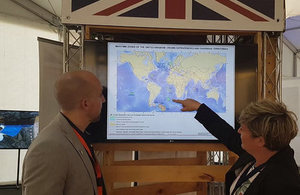UK’s Blue Belt at IV International Congress of Marine Protected Areas
UK is on course to protect around 4 million square kilometres of waters around the UK Overseas Territories.

Francisco Alvarez (Science & Innovation Officer, BE Santiago) and Kylie Bamford (FCO, Polar Regions Department) at the British stand in IMPAC4.
The UK will be showcasing its expertise in marine conservation and protection at the 4th International Congress of Marine Protected Areas in La Serena – Coquimbo, Chile, during 4-8 September.
The UK and the Overseas Territories are custodians to the fifth-largest marine estate in the world and as such have an obligation to protect species and habitats against detrimental human impacts.
As announced by the Foreign Office Minister Sir Alan Duncan at the Our Oceans conference in 2016, the UK is on course to protect around 4 million square kilometres of waters around the UK Overseas Territories.
UK Government agencies the Centre for Environment, Fisheries and Aquaculture Science (Cefas) and the Marine Management Organisation will be supporting the development and delivery of appropriate marine management strategies across the relevant UK Overseas Territories.
IMPAC4 provides the UK an opportunity to demonstrate world leading marine policy development, together with expertise in all areas of marine protection including scientific research and compliance and enforcement strategies leading to comprehensive integrated marine management systems
Note to editors:
- The Blue Belt programme is an ambitious policy to protect and conserve the marine environments of the UK Overseas Territories.
- The UK is on course to protect around four million square kilometres of waters around the UK Overseas Territories – greater than the landmass of India.
- In 2016 the UK announced the designation of protected areas around St Helena (444,916km²) and Pitcairn (840,000 km²) and a commitment to designate marine protection zones around Ascension (445,390km²) by 2019 and Tristan da Cunha (750,510km²) by 2020.
- The UK has previously declared Marine Protected Areas in British Indian Ocean Territory (BIOT; 640,000 km2 designated in 2010); South Georgia & the South Sandwich Islands (SGSSI; 1 million km2 designated in 2013); and the UK led, internationally agreed MPA on the Southern Shelf of the South Orkney Islands, through the Convention on the Conservation of Antarctic Marine Living Resources (British Antarctic Territory 94,000 km2 in 2009).
- The Centre for Environment, Fisheries and Aquaculture Science (Cefas) is a world leader in marine science and technology, providing innovative solutions for the aquatic environment, biodiversity and food security. Cefas has partnerships with governments, industries and scientific organisations, helping create and secure healthy and sustainable marine and freshwater environments.
- The Marine Management Organisation is the non-departmental public body which licenses, regulates and plans marine activities in the seas around England and Wales so that such activities are carried out in a sustainable way. The MMO is experienced in spatial and temporal marine management, and is delegated by the Secretary of State to prepare and manage marine plans in English and Welsh waters. The MMO also has responsibility for fisheries management, including fisheries licensing and surveillance, monitoring and enforcement of vessels within English and Welsh waters.
- Since 2005, the Marine Protected Areas (MPAs) global community has convened every four years at IMPAC, a congress designed for managers and practitioners of marine conservation through MPAs. IMPAC4 aims at sharing knowledge and experiences, and joining efforts to strengthen best practices on MPA application and management, for the effective conservation of marine biodiversity, and natural and cultural heritage of the oceans.
- The first three meetings of IMPAC were held in Geelong, Australia (2005), Washington D.C., USA (2009) and Marseille, France (2013). IMPAC has not only grown in participation and representation of different countries and organisations committed to marine management, but is also gathering momentum as a highly relevant platform both technically and politically to promote MPAs as a key instrument for ocean sustainability.